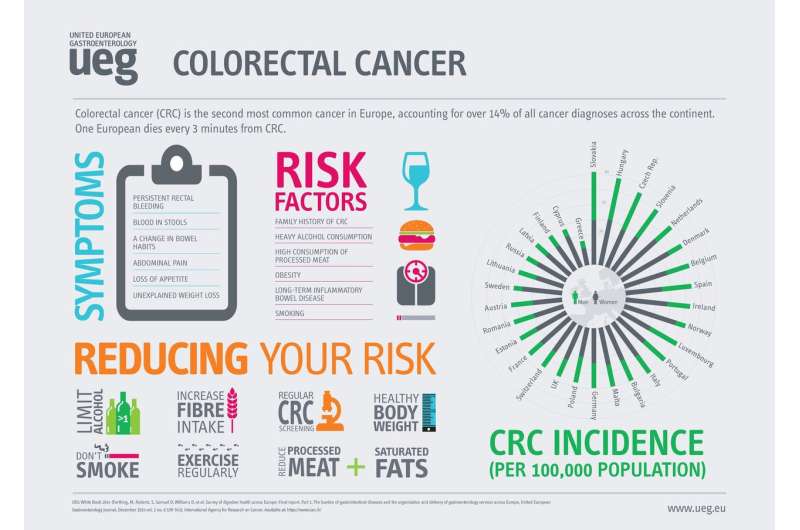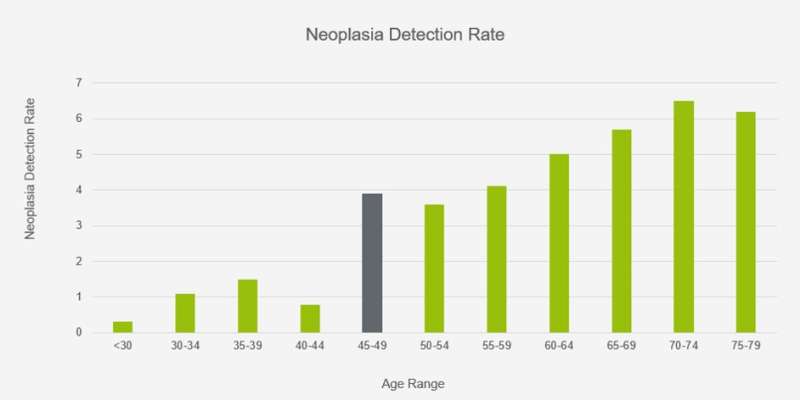Colorectal cancer screening should start at 45, new research shows

Screening for colorectal cancer (CRC) should begin at 45 years of age to match rising mortality rates in young adults, research presented today at the 25th UEG Week Barcelona reveals.
Scientists in France analysed 6,027 colonoscopies and found a 400% increase in the detection of neoplasia (the new, uncontrolled growth of abnormal tissue) in patients aged between 45-49 in comparison to patients aged 40-44. The neoplasia detection rate was also 8% higher in people aged between 45-49 than it was between 50-54, leading to calls for CRC screening programmes to begin at 45 years of age.
The mean number of polyps (growths on the inner lining of the colon that can turn cancerous if left untreated) and the adenoma detection rate (proportion of individuals undergoing a colonoscopy who have one or more adenomas detected) also increased by 95.8% and 95.4% respectively between the 40-44 and 45-49 age groups. This was far more substantial than the increase between the 45-49 and 50-54 age groups, which was 19.1% and 11.5% respectively.
Lead researcher, Dr David Karsenti, who will present the findings for the first time today at UEG Week, explains; "These findings demonstrate that it is at 45 years old that a remarkable increase in the colorectal lesions frequency is shown, especially in the detection rate of early neoplasia. Even when patients with a familial and personal history of polyps or cancer are excluded from the findings, there is still a noticeable increase in detection rates in patients from the age of 45."

CRC is the second most common cause of cancer-related death in Europe, killing 215,000 Europeans every year, with research recently revealing that three in ten CRC diagnoses are now among people younger than 55. There is strong evidence to demonstrate that screening for CRC reduces incidence and mortality rates, yet there are vast inequalities in CRC screening across Europe with both organised and opportunistic schemes, different types of tests and varying participation and detection rates. Despite the dramatic rise of CRC in young adults, the vast majority of screening programmes throughout Europe commence between the ages of 50 and 55, with some not beginning until the age of 60.
Dr Karsenti adds "Regardless of the type of screening that is in place, the results of our research strongly indicate that screening for colorectal cancer should begin at the age of 45. This will this help us to increase the early detection of colorectal cancer in young adults and also enable the identification and safe removal of polyps that may become cancerous at a later date."

More information: 1. Karsenti, D. et al (2017), Adenoma detection rate according to age: colonoscopy screening should start at 45 years old, Presented at the 25th UEG Week Barcelona, October 30, 2017.
2. Epidemiology of colorectal cancer: international comparison, 4th European Colorectal Cancer Days 2015. Available at: www.crcprevention.eu/index.php … -cancer-epidemiology
3. Dramatic rise in colorectal cancer in younger adults (2017), Medscape. Available at: www.medscape.com/viewarticle/876409














